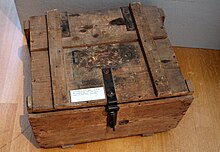Alexander Koenig
Alexander Ferdinand Koenig (born February 8 . Jul / 20th February 1858 greg. In St. Petersburg ; † 16th July 1940 at Castle Blücherhof , Klocksin , Mecklenburg ) was a German zoologist and founder of today's Museum Koenig in Bonn .
Life
Alexander Koenig was the son of Leopold Koenig , the "Sugar King". He established a sugar empire in St. Petersburg and the Ukraine in the 19th century . In addition, the family of German descent owned large estates in what is now Ukraine.
At the age of nine, Alexander Koenig came to Bonn, where his father had bought a large villa on the banks of the Rhine (today Villa Hammerschmidt ). There he attended the Royal High School together with his brother Carl Koenig , the father of the writer Hertha Koenig , until 1874. Easter 1874 he moved to the Arnoldinum high school in Burgsteinfurt . He began as Obertertianer with the collection of bird eggs and animal specimens. In his memories of an old student from Burgsteinfurt (Bonn 1933), Koenig describes these years as the most formative for his professional future. In 1880 he passed the Abitur at the Arnoldinum, which he passed two years later on March 18, 1882 at the humanistic high school in Demmin , Pomerania .
He studied zoology at the Universities of Greifswald (from 1880 initially with “small matriculation” until he had made up his Abitur), Kiel , Berlin and Marburg , where he was awarded a doctorate degree in 1884 with a dissertation on taxonomic problems in mallophages (bird lice). phil. received his doctorate. In the summer of 1884 he married Margarethe Westphal (1865–1943) from Demmin . He completed his habilitation in Bonn in 1888 with a thesis on the birds of Tunis and in 1894 was appointed professor of the Philosophical Faculty of the Rheinische Friedrich Wilhelms-Universität Bonn . Bengt Berg worked with him from 1909 to 1913.
After numerous research trips, he laid the foundation stone for the construction of a natural history museum in Bonn in 1912 , which was named after Koenig Museum Koenig . The shell was already in place in 1914, but the completion of the building was delayed by the war and the occupation, when the building served as barracks. In addition, Koenig lost all of his fortune due to inflation. In 1929 he donated the museum to the German Empire. It was opened in 1934. After that he lived in Bonn and on his estate in Mecklenburg until his death.
The Parliamentary Council of the Federal Republic of Germany held its opening session on September 1, 1948 in the Museum Koenig.
Some of the collections he began in his youth, mainly of mammals and birds, can still be seen in the Koenig Museum today. a. two giraffes that he brought back from a visit to the Kordofan region, today's Sudan . From 1905 to 1908, expeditions took him to the arctic region around Spitzbergen as well as to northern and northeastern Africa .
Alexander Koenig died on July 16, 1940 at his country estate "Blücherhof" in Mecklenburg. He was buried in Bonn's southern cemetery. The city of Bonn has dedicated Alexander-Koenig-Straße, which is halfway up Bonn's Venusberg, to him.
Awards and honors
literature
- Ludwig Gebhardt: Koenig, Alexander. In: New German Biography (NDB). Volume 12, Duncker & Humblot, Berlin 1980, ISBN 3-428-00193-1 , p. 332 f. ( Digitized version ).
- Josef Niesen : Bonn Personal Lexicon. 2nd, improved and enlarged edition. Bouvier, Bonn 2008, ISBN 978-3-416-03180-6 .
- Alexandra-Kathrin Stanislaw-Kemenah: "Lost in thought on the swelling carpet of the polar willow ..." - Alexander Koenig's zoological and ornithological research trips to Spitzbergen 1905–1908 . In: Cornelia Lüdecke, Kurt Brunner (Ed.): From A (ltenburg) to Z (eppelin). German research on Spitzbergen until 1914. 100 years of the expedition of Duke Ernst II of Saxony-Altenburg (PDF; 31.8 MB). Neubiberg 2012 (= series of publications by the Institute for Geodesy , issue 88), pp. 13–21.
Individual evidence
- ↑ Hertha Koenig in Der Fährenschreiber von Libau 1964 - republished in 2012 as Der Zuckerkönig
- ↑ the so-called small matriculation , in which ... those students who could not present a school leaving certificate had to register .
Web links
- Literature by and about Alexander Koenig in the catalog of the German National Library
- Report on Alexander Koenig on the website of the Goethe Institute
- Short biography , way of democracy
- Biography , Portal Rhenish History
| personal data | |
|---|---|
| SURNAME | Koenig, Alexander |
| ALTERNATIVE NAMES | Koenig, Alexander Ferdinand (full name) |
| BRIEF DESCRIPTION | German zoologist |
| DATE OF BIRTH | February 20, 1858 |
| PLACE OF BIRTH | St. Petersburg |
| DATE OF DEATH | July 16, 1940 |
| Place of death | Gut Blücherhof, Klocksin , Mecklenburg |



